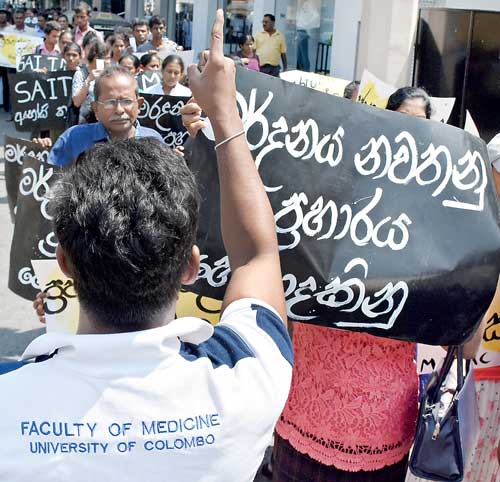Wednesday Feb 18, 2026
Wednesday Feb 18, 2026
Tuesday, 7 February 2017 00:00 - - {{hitsCtrl.values.hits}}
It is always helpful to identify the purpose, or end, of anything that government does. It was very useful to identify the purpose of our aviation policy in discussions of the SriLankan-Mihin fiasco that was eating up three times the resources we were spending annually on Samurdhi. The means (the airlines) had to be looked at in relation to the ends (affordable international passenger and cargo transport services at adequate levels of quality).
Medical education is provided because we need enough physicians to supply the demand for curative and preventive medical services throughout the country. Supply is inadequate for demand now. As the population ages, demand will increase.
The only rationale for spending taxpayer money is the above. There is no valid justification for spending taxpayer money to reward people who did well at a particular examination or to make their families happy unless it serves the end of providing high-quality medical services to the people. The means that most efficiently serve the end must be chosen over those less efficient.
 What is the best way of ensuring an adequate supply of doctors?
What is the best way of ensuring an adequate supply of doctors?
There is no reason to make any fundamental changes to the functioning of medical faculties in Government universities. The best performers at the GCE (AL) examination should continue to be offered admission to Government medical faculties according to the order of merit as at present. The only difference is that the costs of their education would be billed to a tertiary-education account.
The considerable amount of taxpayer money spent on a medical student at a Government university will be publicly available. The Government will guarantee bank loans up to that amount for any student who wishes to enrol in an accredited private medical school.
All medical graduates, public and private, will be offered opportunities to serve in Government medical establishments. Depending on the difficulty of the postings and duration, the amount owed to the Government by graduates of Government medical schools will be forgiven. Work long enough in tough enough places, education will be completely free. If the beneficiary does not wish to work in a rural area or leave the country, he will be obligated to repay the balance in in the tertiary-education account.
Graduates of private medical schools who undertake duties in rural areas will also have their loans forgiven based on the same formula used for Government graduates. They may still have financial obligations if the private educational establishments charge more than what it costs to train a graduate in a Government establishment. But they would still be ahead of where they are now. And the people of this country, the taxpayers, would have received the service they paid for.

Focus on the end not the means
When we focus on the means (supply of Government medical education), we lose sight of the end. Government medical schools were not established to help realise the dreams of young people who want to become doctors. Their purpose is to contribute to the overall goal of providing the taxpayers of this country with adequate medical care.
The above proposal focuses on that end. The taxpayer is not served by providing an expensive medical education to a young woman who leaves our shores because of marriage. She should have that freedom, but should have to pay the costs incurred on her behalf.
Unlike in the present arrangement, another student who got a few marks less at a particular exam in a particular year would not be deprived of the opportunity to realise her dream by obtaining an education from a private medical school.
The taxpayer money would be better spent. More dreams would be responsibly realised and our people would receive better medical care.